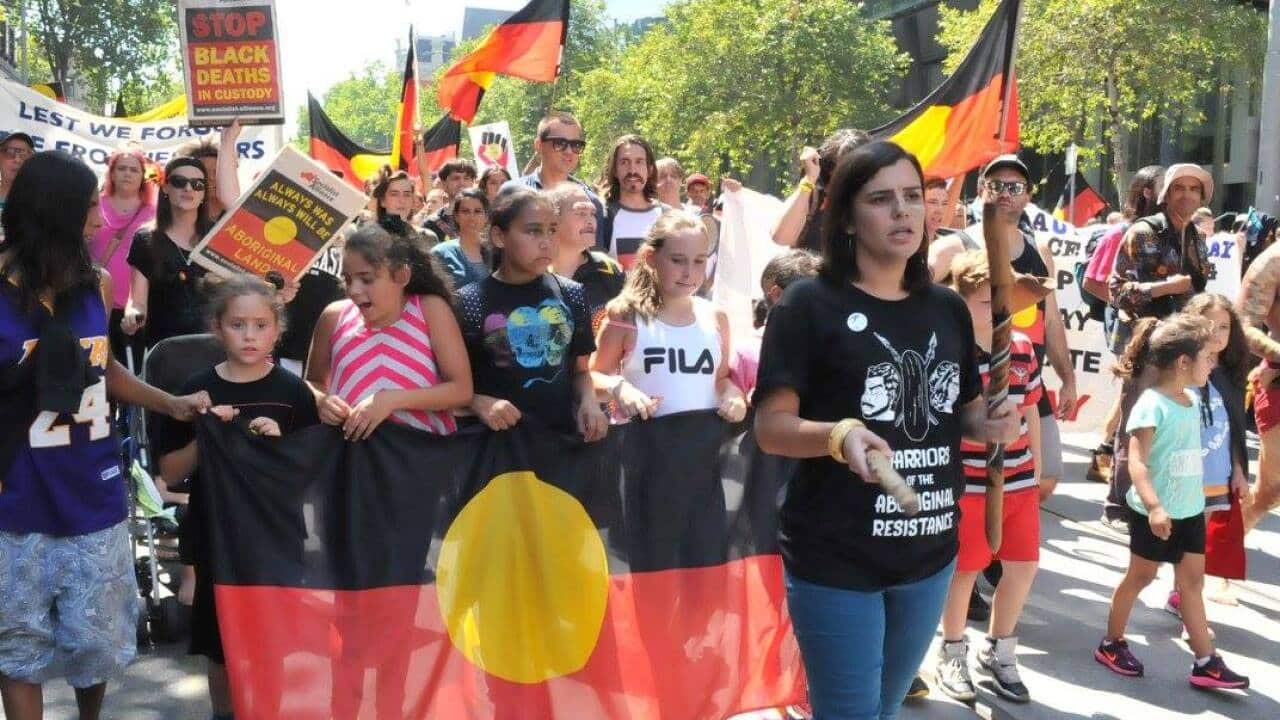As one of the organisers of Warriors of the Aboriginal Resistance (WAR) Meriki Onus sees her role as a continuation of protest and resistance to colonisation that goes back generations, and readily pays her respects to those who have gone before her.
Since 2015, WAR has been involved in organising an annual protest of the national celebration of Australia Day, otherwise known as Invasion Day.
As Meriki says simply, “It is the epitome of colonialism to celebrate the invasion of Aboriginal people. So we call it Invasion Day.”
Tomorrow will see thousands of people descend on Melbourne city to show their support for Aboriginal and Torres Strait Islander communities who have borne the harsh brunt of colonisation since 1788. Yet these protests are not new. In Victoria, resistance to colonialism has included everything from Gunditjmara and Gunnai warriors fiercely defending their lands, to astute Wurundjeri diplomats such as William Barak writing petitions in eloquent English.
Yet these protests are not new. In Victoria, resistance to colonialism has included everything from Gunditjmara and Gunnai warriors fiercely defending their lands, to astute Wurundjeri diplomats such as William Barak writing petitions in eloquent English.

Meriki at the Aboriginal Deaths in Custody Snap Action, 2018 (Supplied) Source: Supplied
“Every single Aboriginal person, our lives are shaped by resistance, because this settler-colony is set up at our expense.”
Tomorrow’s protest, Meriki says, will be “following in the footsteps of the 1938 first protest by William Cooper and other Aboriginal activists.”
Meriki reflects on why protesting Australia Day is important, not just for Aboriginal people, but for non-Aboriginal people as well.
“I was just thinking yesterday at a t-shirt painting day that we had at the Victorian Aboriginal Health Service how hard it was to exist on that day for everyone, what our feelings were and how difficult it was to have everyone around you celebrating, flying the butcher’s apron.”
“The Australian flag is now a symbol of white nationalism. And we’ve got Nazis using that flag as a symbol of their white nationalism. That’s what it’s become.”
Considering her family history, like many others in south-eastern Australia, the celebration of colonisation is particularly hurtful.
“I really link the celebration to the violent attempt of extermination of my people [the Gunnai and Gunditjmara]. It’s an awful thing to celebrate dispossession and genocide for anybody.”
Yet she — and many others — are determined to change the conversation.
“Now we get to talk about it on our terms. I feel like there’s a sense of liberation in being able to talk about settler-colonialism and invasion on our terms. And that’s one thing that WAR and other people involved in organising should be proud of.”
Meriki says that, unlike many people’s misconception, the protest’s aim is not about ‘changing the date’. Instead, the aim is to drive the conversation on the ongoing issues affecting Aboriginal and Torres Strait Islander communities.
 In fact, as Meriki points out, there is not much to celebrate at all, citing the recent tragedy of five teenage Aboriginal girls committing suicide already in 2019.
In fact, as Meriki points out, there is not much to celebrate at all, citing the recent tragedy of five teenage Aboriginal girls committing suicide already in 2019.

Meriki Onus speaking at the Invasion Day rally. Melbourne, 2018 Source: Ali MC

Meriki Onus at the Invasion Day rally. Melbourne, 2018 (Supplied) Source: Supplied
“I did see someone on Twitter say that, ‘why don’t we just change the date, it would be the easiest thing and the quickest way to shut blackfellas up’. But that is like a big easy out. It will pacify the masses; whitefellas and government will walk away with a sense of pride and appease of white guilt, and literally, nothing will change about the incarceration or the Stolen Generations or dispossession in this country. ”
And the protests are growing larger each year. Meriki recalls that in 2015, they thought that only 50 people would show up, but there ended up being about 5000 people who “came out of nowhere.” Last year, it was estimated around 50 000 people descended on Melbourne to show their support and shut down the city.
Last year, it was estimated around 50 000 people descended on Melbourne to show their support and shut down the city.

Meriki with her family, Aunty Majorie Thorpe (middle) (Supplied) Source: Supplied
“And that’s not a testament to our work but a testament to the historical work of activism done by the older generation of activists.”
Being prominently involved in the protests each year has come at a personal cost. Meriki has been subject to intense online abuse, even including death threats and threats of sexual violence.
Yet there has also been a growing non-Aboriginal support for the protests, including Jewish and Muslim groups.
“We’ve had an amazing response from allies this year. It’s confirming with our community that we are getting support from all around the world.”
Meriki also cites the importance of community and family as being the bedrock to her support in her activism.
“I come from a strong community and a very strong family, and a very strong network and mentors. When you are outspoken and talk about highly political issues, you can’t act alone. And that’s really important, as it will overcome you. I have big sisters I could lean on, I have a mother who can catch me, and older Aboriginal activists such as Gary Foley that I could lean on.”
No one can touch you if your people back you.”
The Invasion Day rally in Melbourne meets at the steps of Parliament House at 10.30am. For information go to the .
Ali MC (Alister McKeich) is a writer, photographer and legal professional who holds a Masters in Human Rights Law. His work documents global human rights issues, and he has had the privilege of working with a number of Aboriginal communities here and internationally. Follow

